21 Tips for Retiring Single: Planning Your Golden Years
Retiring single can be just as fulfilling as retiring with a spouse or partner. With a little proactivity and financial planning, you can set the foundations for your dream retirement today.

- Written by Christian Simmons
Christian Simmons
Financial Writer
Christian Simmons is a writer for RetireGuide and a member of the Association for Financial Counseling & Planning Education (AFCPE®). He covers Medicare and important retirement topics. Christian is a former winner of a Florida Society of News Editors journalism contest and has written professionally since 2016.
Read More- Edited By
Savannah Pittle
Savannah Pittle
Senior Financial Editor
Savannah Pittle is a professional writer and content editor with over 16 years of professional experience across multiple industries. She has ghostwritten for entrepreneurs and industry leaders and been published in mediums such as The Huffington Post, Southern Living and Interior Appeal Magazine.
Read More- Reviewed By Bart Astor
- Published: August 23, 2022
- Updated: October 10, 2023
- 12 min read time
- This page features 9 Cited Research Articles
- Edited By
- Explore new hobbies.
- Create financial goals and work toward them.
- Join a class or club to make new connections.
- Travel to a bucket-list location.
- Volunteer with your community.
- Understand your income and estate plan.
- Spend time with your children and grandchildren.
If you’re planning to retire single, you’re not alone. As of 2020, almost one in three adults aged 60 and older live by themselves. While some people might dread the idea of retiring without a partner, others are empowered by it.
In fact, 46% of single non-daters aged 50 and older don’t want a relationship because they “just like being single.”
After all, being single means you can live more spontaneously, spend more time pursuing your passions and avoid arguments about where you’re going to eat for dinner.
But retiring single also comes with challenges. For example, without a spouse you might need to make more of an effort to connect with others, take care of yourself in your later years and achieve your financial goals.
To help you make the most of your golden years, our tips for retiring single will tell you everything you need to know.
1. Envision Your Dream Retirement
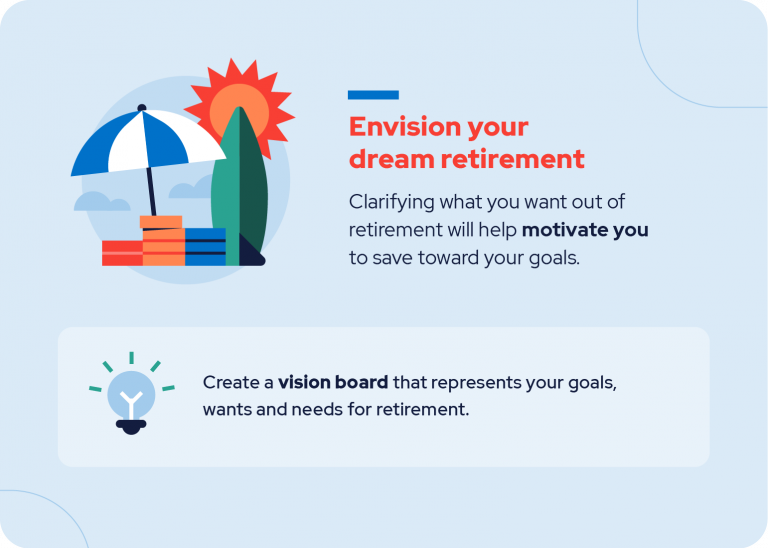
Before you start planning, you should clarify what you want out of retirement. This will help you determine how much you need to save.
- What do you want to do in your free time?
- Where would you like to live?
- How will you maintain your health?
Depending on your answers to these questions, your retirement plan will shift. For example, if you’d like to live in a luxurious cabin in nature, housing will likely require more savings than if you lived in a studio apartment in your hometown.
That said, there are routes to get to any retirement destination you could dream up. Envisioning a lavish retirement can even help motivate you to budget and work toward achieving those goals.
2. Create Financial Goals
Once you’ve determined your dream retirement, it’s time to get more specific with financial goals.
- How much will you need to afford your lifestyle?
- How much money will you need to save each year?
- How much debt do you currently have?
- What does your credit score look like?
If you have credit card or student loan debt, one of your first goals might be to pay them off. If your credit score doesn’t look too good, you might make a goal to improve your credit. These mini-goals will help inform you about how much money you need to retire in total.
3. Build Your Emergency Savings
Sometimes large expenses can come out of nowhere. Maybe your car breaks down, you get laid off or you have a pet that needs surgery. In these situations, it’s good to have a nest egg saved up.
A common benchmark sum to save for an emergency is about four to six months’ worth of living expenses.
4. Develop a Support Network
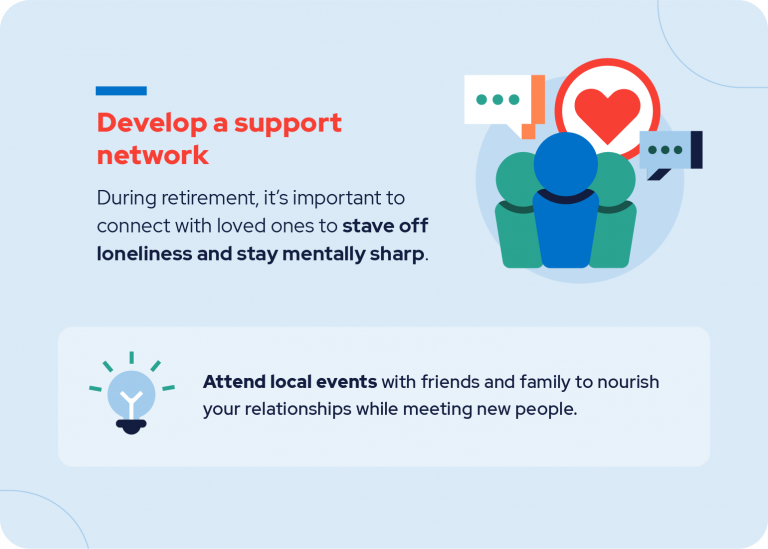
It’s no secret that social fulfillment is crucial for your overall sense of well-being and happiness. Research even suggests that social isolation and loneliness can result in negative side effects on par with obesity and smoking.
To develop your social connections, attend events, join communities or reach out to old friends or family. When you regularly check in with your loved ones either in person or over the phone, you can build lasting connections that follow you into your golden years.
5. Consider Long-Term Care Insurance
There’s always a chance that, at some point, you’ll need help taking care of yourself. Without a partner, this can be a difficult task to fulfill, which is why it can be helpful to invest in long-term care insurance.
If you need constant care, long-term care insurance can help you pay for assisted care and housing since Medicare does not offer coverage for this type of service. Keep in mind that the younger and more healthy you are when buying a policy, the cheaper it will cost.
6. Find a Part-Time Job
While you might not want to work 40 hours a week during retirement, part-time jobs can provide structure and purpose to your golden years, as well as extra income. Assuming you’re financially stable, however, your part-time job can be less about making money and more about doing work that you enjoy.
You may want to try freelancing, become self-employed or branch out to a new industry that you’re passionate about. Just remember to monitor your mental health and make sure that your part-time job is never getting in the way of your happiness.
7. Prioritize Estate Planning
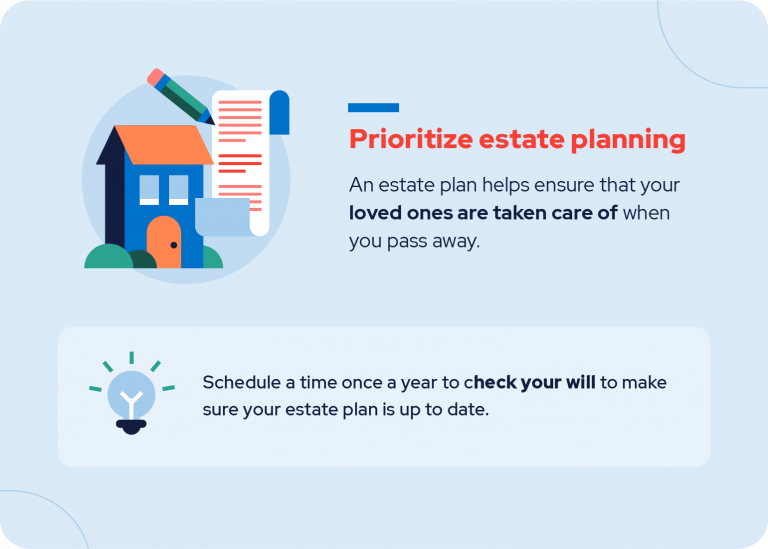
For singles, estate planning is particularly important since you don’t have a partner to help distribute your assets down the road after you pass away. While you likely have things that you’d like to leave to your loved ones, only about half of adults aged 50 to 64 have a will.
An estate plan will ideally lay out your funeral arrangements, guardians for your children and an executor to carry out your will. Keep in mind it’s also important to update your beneficiary designations in any retirement accounts or life insurance policies in your name.
8. Understand Your Social Security Options
To maximize your monthly Social Security check, you need to delay your benefits until age 70. That said, if you are widowed or were previously married for at least a decade, you could also claim benefits taking into account your ex’s earnings.
For more information about the Social Security application process and other important considerations, check out our full guide on Social Security benefits.
9. Invest in Annuities
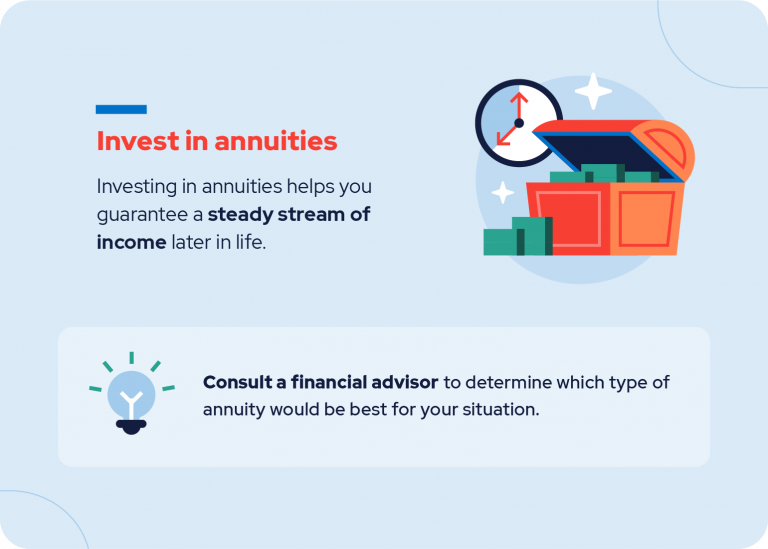
Annuities can be a great way to guarantee a steady stream of income later in life. When you’re single, annuities tend to pay more since you don’t have a partner to transfer your funds to in the event of your passing. Research the different annuity types to see which is right for you.
10. Select Someone to Make Decisions for You
As a solo retiree, it’s important to designate someone who can make health care or financial decisions for you if you are unable to make them yourself. This means that, if you become ill or otherwise incapacitated, you still have someone who can carry out your wishes.
Normally, people choose trusted friends or relatives as their health care proxy. However, the person you designate as executor doesn’t have to also be the designee for your health care proxy. But the executor should at least know who the designee is and where the documentation resides.
If nobody comes to mind, however, the next best thing is to complete a proxy form that lists the medical treatments that you are for and against.
11. Choose the Right Location for You
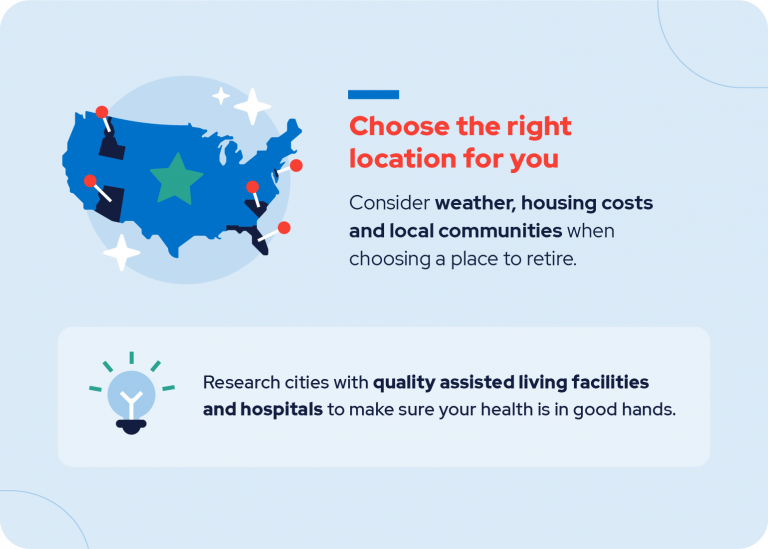
Your retirement location has a large impact on the quality of your golden years. For example, a place you love to visit might be great for vacation, but may not be suitable for retirement.
- Weather: Do you thrive in sunny summers or cold winters? Do you want to live close to nature, or in a bustling city?
- City life: Since you’re single, you might need to go out to socialize with new people. Research the communities and activities around the area to see if it’s a place you’d like to call home.
- Costliness: A location could be perfect on paper but too costly for your budget. This could mean that you have to choose a different location or adjust your savings strategy to afford living expenses.
- Retirement communities: Retirement communities are an affordable housing option for those who want a built-in community with their home. There are even singles-only communities available for seniors without a partner.
Whether you choose to live alone, with roommates or in a retirement community, there is no shortage of options when it comes to choosing a retirement location. Before you make a decision, make sure you calculate the total retirement sum you need to live comfortably. This will impact what your budget looks like for housing.
12. Step Out of Your Comfort Zone
One of the most difficult challenges of retirement can be avoiding monotony. While routines can be nice, it’s also good to try new things to keep the days from blending in with one another.
For example, you may want to try scheduling a dance class, cooking a new recipe or facing your fear of heights on a hike.
13. Use an Alert System
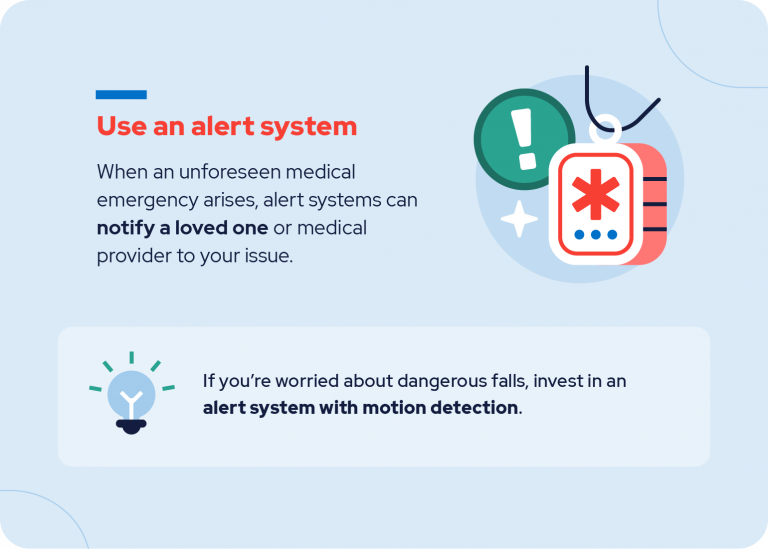
As you age, you become more susceptible to unforeseen medical emergencies and dangerous falls. This can be daunting when you don’t live with a partner to look out for you. Luckily, medical alert systems and virtual assistants like Google Alexa can keep you safe.
A medical alert system is a device that connects you with your loved ones or medical professionals in the event of an emergency. You could wear an alert device as a watch or a necklace, or simply put it away somewhere safe and accessible.
Before choosing your alert system, do your research to make sure you’re buying a device that fully meets your needs and is from a trustworthy company. If you’re worried about dangerous falls, for example, you may want a device with motion detection to alert someone when you drop.
Similarly, digital assistants such as Google’s Alexa can respond to phrases such as “Alexa, I’ve fallen and can’t get up” with “Would you like me to call 911?”
Keep in mind that sometimes these systems are not enough to keep you safe. Evaluate your home health care options to ensure you’re properly taken care of.
14. Go on a Date
It’s never too late to find love. Even if you’re not looking for a serious relationship and simply want to connect with a new person over dinner, during retirement you’ll have plenty of time to explore your romantic side.
Whether you meet someone through your retirement community, a mutual connection or online, there are plenty of avenues where you can find a partner. You could even try dating sites geared toward seniors such as SilverSingles or eharmony.
15. Travel
With your schedule clear during retirement, you can fulfill any dreams you have of traveling. Whether you want to ferry across Niagara Falls or explore the tropical beaches of Hawaii, there are an endless number of senior-friendly vacation options out there.
Before you embark on any far-away vacations, just be mindful to plan your housing and health accommodations well in advance. For example, if you’re traveling overseas, you’ll want to make sure you visit your doctor before you travel and that you’re fully stocked with any necessary medications.
16. Get a Pet
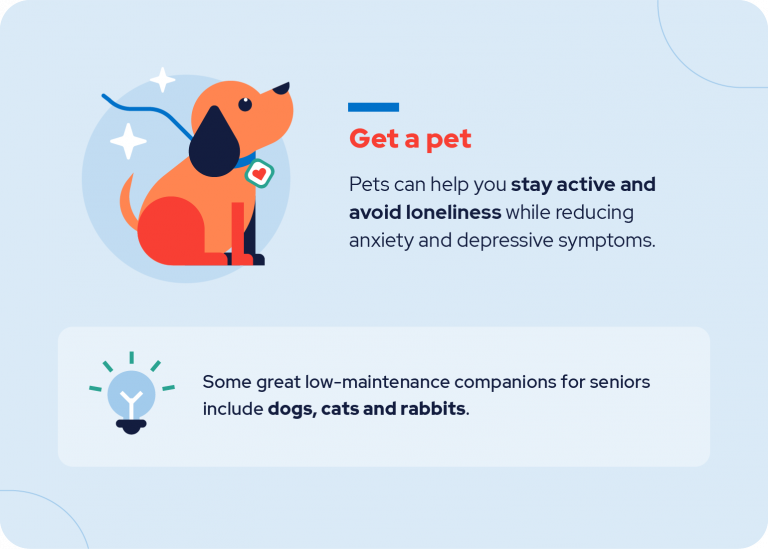
When you’re single, a pet can be a valuable source of companionship. Research suggests that pet ownership can help reduce anxiety, depression and cardiovascular issues.
Adopting a cat or a dog can also have the bonus effect of keeping you active. Additionally, maintaining a routine of feeding your furry friend and taking them outside can add structure to your day and contribute to your overall sense of purpose.
17. Establish a Routine
When you retire, you have plenty of time to build the perfect daily routine. Ideally, you want to include activities that keep you mentally, physically and socially healthy, like going for walks outside or cooking nutritious meals.
After all, you worked hard to enjoy all your free time – sticking to a routine can help you make the most of it.
18. Give Back to Your Community
A great way to build your sense of purpose is to volunteer at your local homeless shelter, animal shelter or library.
- How often do you want to volunteer?
- What are your most valuable skills that organizations could use?
- Which causes do you care most about?
Once you answer these questions, research volunteer opportunities near you to determine where you’d like to apply. As you lend a helping hand, you’ll likely also create new connections that add value to your life.
19. Keep Your Mind Sharp
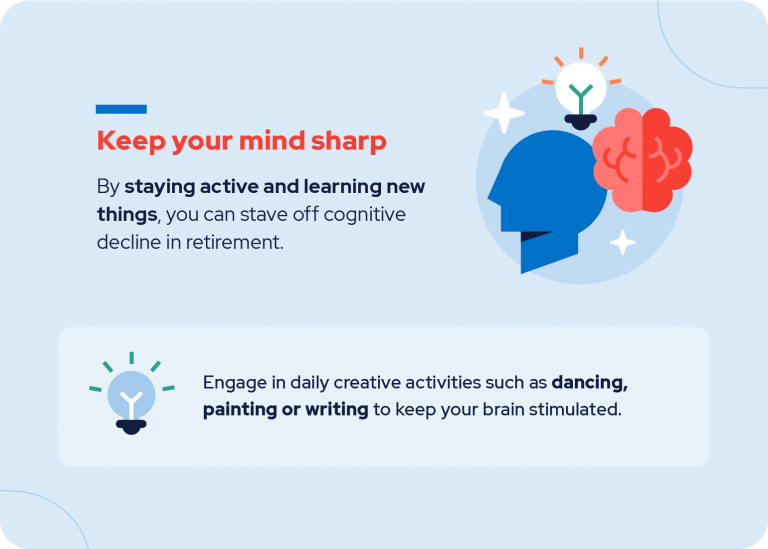
As you age, it’s common to lose some of your mental agility. Maybe you notice that you become more forgetful or can’t focus on tasks for more than a couple minutes. There are ways, however, to support your memory and stay sharp.
- Maintain a consistent sleep schedule
- Eat a diet high in fruits and vegetables while avoiding processed or fried foods
- Practice memory exercises
- Learn a new language or pick up new hobbies
Your mind’s health consists of both the foods you eat, the things you do and the people you interact with. So long as you’re properly taking care of yourself physically, mentally and socially, your brain is sure to remain sharp as a tack.
20. Prioritize Your Health
Maintaining your health will keep you in good spirits and help you enjoy a long, fruitful retirement. Each day you should focus on nourishing your body with well-rounded meals, physical exercise and mental stimulation. Additionally, you should schedule regular health check-ups to make sure that your health is in good condition.
21. Connect With Nature
Making a habit of connecting with nature can reduce stress and symptoms of depression. This is particularly important for retirees, since research suggests that about 2 million senior adults in the U.S. rarely leave their homes — which is associated with a higher mortality risk.
For this reason, it’s a good idea to make plans to connect with nature regularly. Whether you stroll around the park or take some time to relax near your backyard garden, spending a little time outdoors can make a positive impact on your well-being.
Retiring single can be a great way to spend your golden years. When you plan ahead financially and prioritize your health, you set yourself up for a peaceful, fulfilling life. For more senior health care information, talk to a Medicare advisor today.
9 Cited Research Articles
- Administration for Community Living. (2021, May). 2020 Profile of Older Americans. Retrieved from https://acl.gov/sites/default/files/Aging%20and%20Disability%20in%20America/2020ProfileOlderAmericans.Final_.pdf
- Ausubel, Jacob. (2020, March). Older people are more likely to live alone in the U.S. than elsewhere in the world. Retrieved from https://www.pewresearch.org/fact-tank/2020/03/10/older-people-are-more-likely-to-live-alone-in-the-u-s-than-elsewhere-in-the-world/
- Buijs, V. (2021, July). Social Needs and Happiness: A Life Course Perspective. Retrieved from https://link.springer.com/article/10.1007/s10902-020-00287-9
- Celidoni, M. (2017, December). Retirement and cognitive decline. A longitudinal analysis using SHARE data. Retrieved from https://www.sciencedirect.com/science/article/pii/S0167629617308299
- Chavaly, D. (2020). Human nature connection and mental health: What do we know so far? Retrieved from http://ir.psgcas.ac.in/id/eprint/113/1/M.Sc%20Applied%20Psychology%202018%20-%202020Divya%20Chavaly.pdf
- Dave, D. (2006, March). The Effects of Retirement on Physical and Mental Health Outcomes. Retrieved from https://www.nber.org/system/files/working_papers/w12123/w12123.pdf
- Jones, J. (2021, June). How Many Americans Have a Will? Retrieved from https://news.gallup.com/poll/351500/how-many-americans-have-will.aspx
- Martin, F. (2021, December). Depression, anxiety, and happiness in dog owners and potential dog owners during the COVID-19 pandemic in the United States. Retrieved from https://www.ncbi.nlm.nih.gov/pmc/articles/PMC8673598/
- Ornstein, K. (2015, July). Epidemiology of the Homebound Population in the United States. Retrieved from https://jamanetwork.com/journals/jamainternalmedicine/fullarticle/2296016
Calling this number connects you to one of our trusted partners.
If you're interested in help navigating your options, a representative will provide you with a free, no-obligation consultation.
Our partners are committed to excellent customer service. They can match you with a qualified professional for your unique objectives.
We/Our Partners do not offer every plan available in your area. Any information provided is limited to those plans offered in your area. Please contact Medicare.gov or 1-800-MEDICARE to get information on all of your options.
844-359-1705Your web browser is no longer supported by Microsoft. Update your browser for more security, speed and compatibility.
If you need help pricing and building your medicare plan, call us at 844-572-0696



